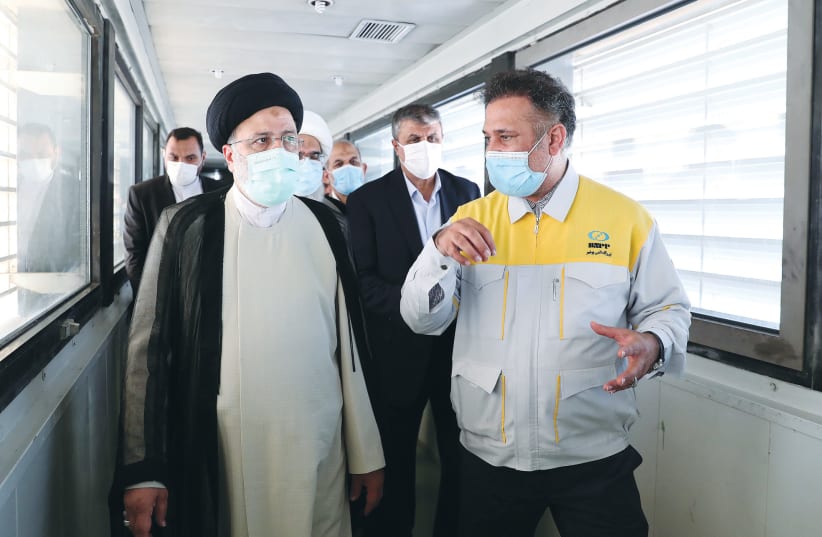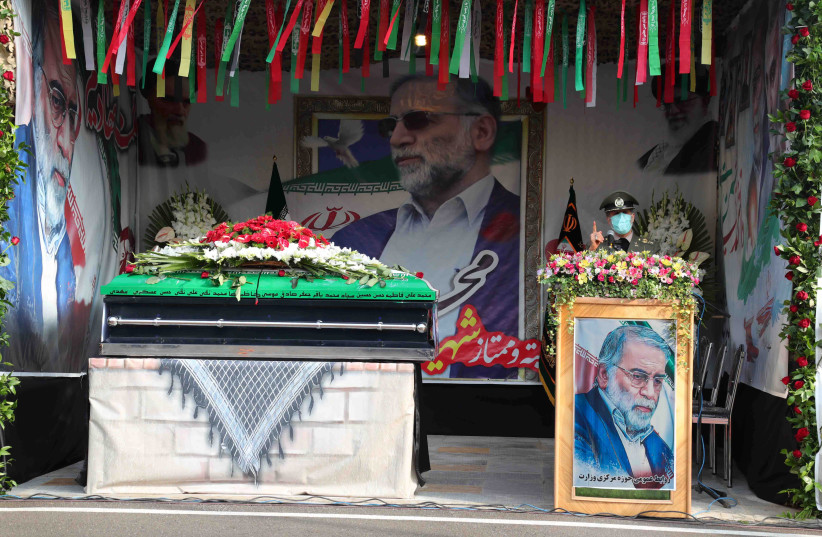The two main protagonists in the Iran nuclear deal issue – the US administration and the Iranian regime – are locked in a battle of wills.
The US refuses to ease the sanctions it has imposed on Iran or reenter the deal – the Joint Comprehensive Plan of Action – unless Iran first undertakes to comply with its terms agreed to in 2015 but since violated.
The Iranian regime has refused to put the brakes on its renewed nuclear activity and comply with the JCPOA unless US economic sanctions are first lifted.
Deadlock. Which of the two is in the stronger position?
Throughout his presidential election campaign, Joe Biden made it clear that he opposed then-president Donald Trump’s withdrawal from the agreement in 2018. He is as adamant as Trump in his opposition to Iran ever gaining a nuclear arsenal, but he – along with the EU and many Western leaders – believes that the best way of achieving that is by way of the deal, flawed though it is. He does not believe that Trump’s policy of economic coercion, known as “maximum pressure,” would deliver an improved agreement.
Accordingly, shortly after he assumed the presidency, Biden initiated talks with Iran aimed at reviving the JCPOA. After six rounds of discussions, contact was suspended in June, two days after hardliner Ebrahim Raisi was elected Iran’s president. Raisi is under personal US sanctions over allegations of human rights abuses in his past as a judge.
On October 2, Iran’s new foreign minister, Hossein Amir-Abdollahian, told a TV interviewer that the US government had “tried to contact me through various channels, and I emphatically told the intermediaries that if the Americans are serious in their intentions, then they must release $10 billion of our frozen assets as a prerequisite.”
That is the regime’s current price for returning to the talks. Its leaders have calculated that Biden has pledged his word to reactivate the JCPOA, that he is politically committed, and that $10b. is a price he is prepared to pay.
Has Iran got the measure of the situation, and will it be able to stick to its demand?
RAISI GAINED the presidency of a nation heavily crippled by wide-ranging US sanctions; in both 2018 and 2019, its economy contracted by more than 6%. The result was widespread public unrest. From the winter of 2017 onward the deteriorating economic situation and its effect on people’s standard of living led to a succession of nationwide public protests. The already dire situation was exacerbated in the summer of 2021 by a long-lasting drought and led to serious riots shortly after Raisi’s election.
Raisi’s prime concern must be to restore a degree of economic and social stability to the country. To achieve this, the sanctions imposed on Iran by the US – and, indeed, those imposed by the UN and the EU – have to be lifted, or at least substantially reduced. The only practical way of achieving this would be for Iran to return to the nuclear deal talks and reach an agreement on a revised JCPOA, with a lifting of sanctions and a large cash sweetener as part of the deal, in line with the terms of the original agreement in 2015.
Yet Raisi must believe he still has room for maneuver. For example, US and UN sanctions on the sale of Iranian oil have been consistently ignored by China. Purchases of Iranian oil by Chinese companies are believed to have helped keep Iran’s economy afloat. And China is one of the signatories of the JCPOA, so it may be relied on to support Iran when negotiations about reactivating it get tough.
He may also choose to discount a Reuters report on September 28. “We are aware of the purchases that Chinese companies are making of Iranian oil,” a senior US official told Reuters. “We have used our sanctions authorities to respond to Iranian sanctions evasion, including those doing business with China, and will continue to do so if necessary.”
This may not concern Raisi overmuch, because he will be aware that battle lines are being drawn for a power struggle between the US and China across a variety of areas, both geopolitical and economic. Positioned firmly as a China ally, Iran – despite its economic and social difficulties – is well placed to stand firm and insist on its demands being met before agreeing to reenter the JCPOA.
It’s a win-win situation for Iran because, if by chance a renewed deal fails to jell, the hardline element within the Iranian regime will rejoice in the fact that its aim of acquiring a nuclear weapon capability is substantially advanced.
In brief, the Biden administration has the short end of the stick. It has rejected Trump’s policy, which considered the 2015 deal to be a free pass to an eventual nuclear Iran and regarded the regime as hell-bent on realizing its objective of political and religious hegemony in the Middle East. From this standpoint there was logic in the US using sanctions to force the leadership back to the table with the aim of securing a more watertight arrangement that would preclude Iran from ever obtaining nuclear weapons.
Biden, on the other hand, is attempting to cajole the Iranian regime back to the table with the carrot of financial inducements, an eventual lifting of sanctions, and the prospect of readmitting it into the so-called “comity of nations.”
This approach – basically conciliation and appeasement, even if backed by strong words – takes no account of the Iranian regime’s own long-term jihadist and political priorities.
Nor does it factor in the reaction of the more moderate Arab states, which regard with alarm Iranian ambitions and the regime’s efforts to undermine and subvert their own administrations. Biden’s approach jeopardizes America’s standing in the Arab world.
Weighed in the balance, the advantage in this particular game of diplomatic chess lies with the Iranian regime. Perhaps the US Democrat administration needs to reconsider its conviction that everything Trump did was automatically misconceived.
The writer is Middle East correspondent for Eurasia Review. His latest book is Trump and the Holy Land: 2016-2020. Follow him at: www.a-mid-east-journal.blogspot.com.

